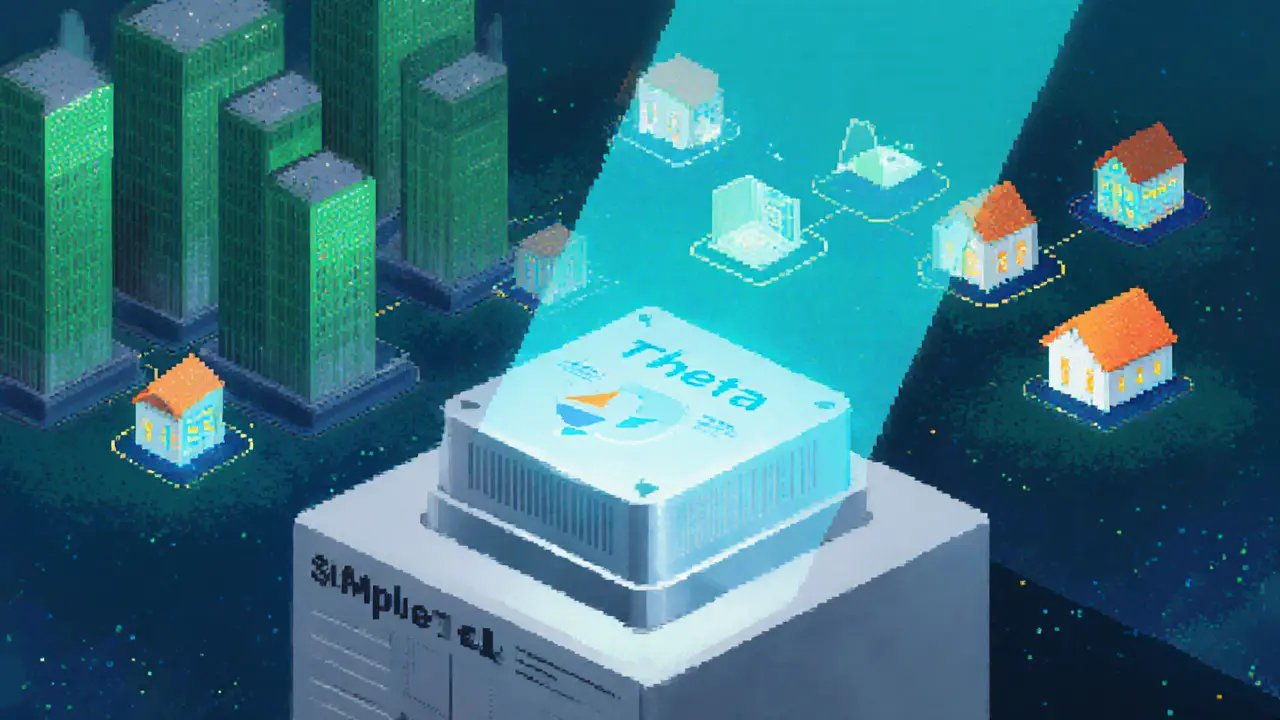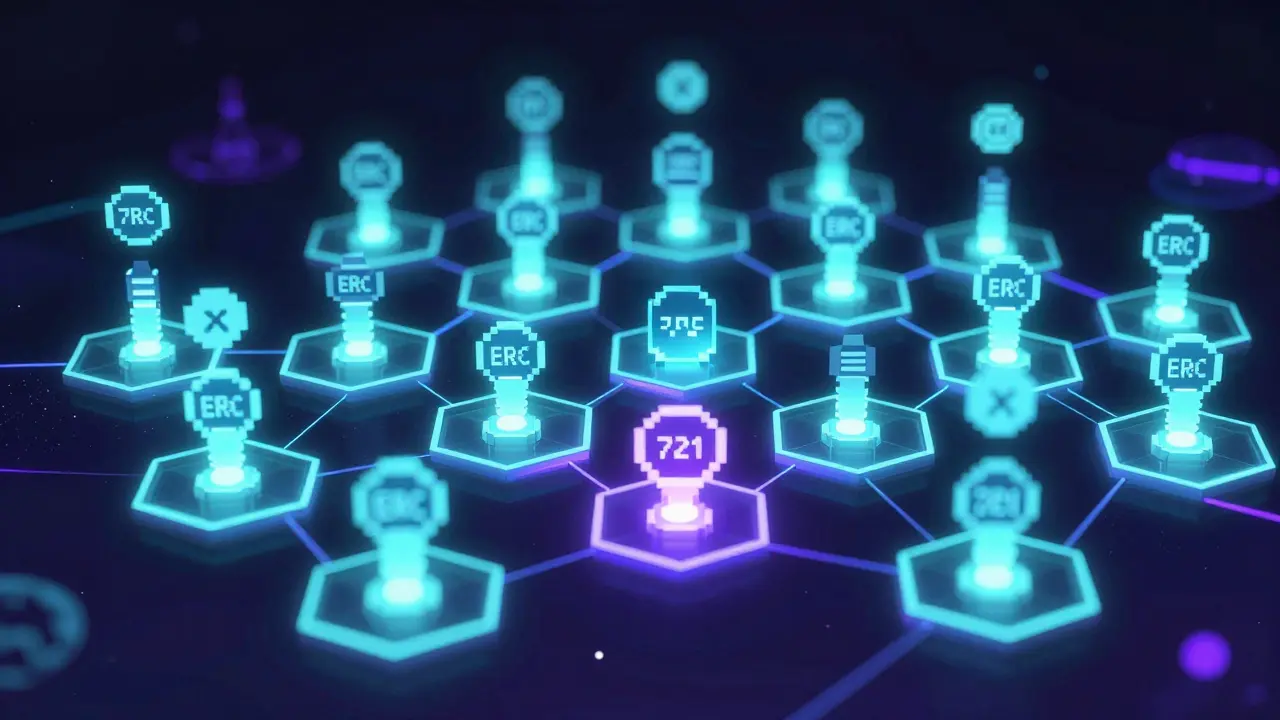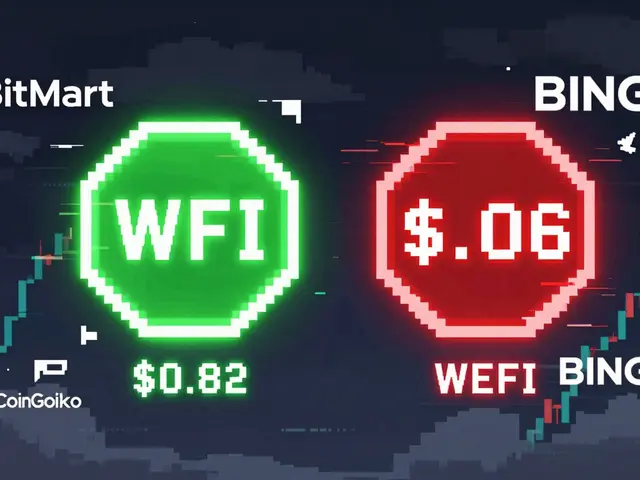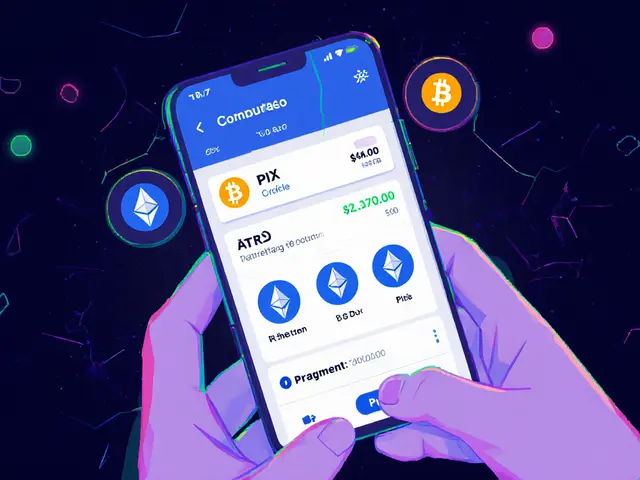Theta Network Token Calculator
THETA Staking
Earn passive income by staking your THETA tokens.
Edge Node Earnings
Earn TFUEL by sharing your bandwidth.
THETA Staking Calculator
Estimated Staking Earnings
Edge Node Earnings Calculator
Estimated Edge Node Earnings
About Theta Network Tokens
THETA is used for staking and governance, while TFUEL powers transactions and rewards Edge Nodes. Both tokens are essential to Theta's decentralized video streaming ecosystem.
Staking yields ~5-7% annually, while Edge Nodes typically earn $1-$5/month depending on bandwidth and usage.
TL;DR
- Theta Network is a Layer‑1 blockchain built for video, AI, and entertainment.
- It uses two native tokens: THETA for staking/governance and TFUEL for gas and rewards.
- Three node types - Enterprise Validators, Guardian Nodes, and Edge Nodes - keep the network fast and decentralized.
- Major partners like Google, Samsung, and Sony help run the validator council.
- THETA trades around $0.73 (Oct2025) with >$28M daily volume, showing solid liquidity.
When you hear people talk about "Theta Network" they’re usually referring to a blockchain that tries to fix the biggest pain point in video streaming: the distance between a viewer and the data center that serves the video. By turning every viewer’s spare bandwidth into a mini‑server, Theta can deliver smoother streams while cutting costs for content creators. Below we break down what Theta is, how its dual‑token system works, the tech behind the network, real‑world use cases, and what you can do with the tokens today.
Theta Network is a Layer‑1 blockchain designed for decentralized video streaming, AI, and entertainment launched its own blockchain in March2019 after an initial ERC‑20 sale in 2017. The platform’s core idea is simple: let viewers share unused upload bandwidth, then reward them with crypto. Those rewards flow through two native assets - THETA the governance and staking token and TFUEL the utility token used for transaction fees and edge‑node payouts. Together they create an economic loop that keeps the network healthy and incentivizes participation.The Dual‑Token Economy: THETA vs. TFUEL
Understanding the difference between THETA and TFUEL is key before you decide to buy, stake, or run a node.
| Attribute | THETA | TFUEL |
|---|---|---|
| Role | Staking, governance, validator selection | Gas for smart contracts, rewards for Edge Nodes |
| Supply | Fixed at 1billion tokens | Inflationary - minted as block rewards |
| Typical holders | Long‑term investors, validator operators | Content creators, edge‑node operators, dApp users |
| Price (Oct2025) | ≈$0.73 | ≈$0.03 |
| Consensus impact | Determines validator voting power | Paid out for relaying video chunks |
THETA holders can lock up their tokens (staking) to earn a share of the network’s transaction fees. The more THETA you stake, the higher your chance of being selected for the Validator Committee - a small group of 10‑20 nodes that give the first stamp of approval on new blocks. TFUEL, on the other hand, is earned every time an Edge Node streams a video chunk or processes a smart‑contract call. It’s the “fuel” that keeps the network moving.
How Theta’s Architecture Keeps Video Smooth
Traditional streaming relies on big CDN data centers that sit far from many users. When a viewer’s connection to the CDN is weak, the video buffers or drops quality. Theta flips that model by creating a three‑tier node system:
- Enterprise Validator Nodes run by companies like Google and Samsung, these nodes propose and produce new blocks.
- Guardian Nodes run by community members, they seal blocks and monitor validator behavior.
- Edge Nodes individual users who share spare bandwidth and earn TFUEL for relaying video data.
The Validator Committee first checks each transaction using a Multi‑BFT (Byzantine Fault Tolerance) algorithm. After that, the larger Guardian Pool finalizes the block. This two‑step process lets Theta hit roughly 1,000 transactions per second while staying decentralized.
Edge Nodes sit much closer to viewers than traditional CDN servers. When you watch a Theta‑powered stream, your device may pull video chunks from a neighbor’s Edge Node a few miles away instead of a data center hundreds of miles distant. The result is lower latency, fewer stalls, and cheaper bandwidth costs for the content provider.
Big‑Name Partnerships Back the Tech
Theta’s credibility comes largely from its corporate validator council. Google provides cloud infrastructure and runs a validator node joined early, followed by Samsung operates a validator and supplies hardware for Edge Nodes. Other validators include Sony runs a validator node and collaborates on 3D‑NFT projects, Binance, and Creative Artists Agency (CAA).
Advisors Steve Chen (YouTube co‑founder) and Justin Kan (Twitch co‑founder) also sit on the board, lending industry‑specific insight on how to scale video delivery.

Real‑World Use Cases: From VR to NFTs
Theta isn’t just a tech demo - it’s already powering several live services. Samsung’s VR platform streams 360° video using Theta’s EdgeCast technology, which caches and relays live streams in real time. The Theta Video API lets developers embed decentralized streaming into apps without paying CDN fees. Companies like Cinedigm and Shout!Factory use the API for movies and TV shows, cutting distribution costs by up to 40%.
On the NFT side, the ThetaDrop marketplace partners with big entertainment brands. Katy Perry’s team helped launch a limited‑edition T‑drop token, and the platform runs NFT drops for the NHL’s Vegas Golden Knights, NBA teams, and top esports leagues. These collaborations showcase how Theta can blend streaming and collectibles in a single ecosystem.
How You Can Participate - Staking and Edge Nodes
If you own THETA, the easiest way to start earning is staking. Most major exchanges (e.g., Binance, KuCoin) offer a custodial staking pool where you lock up your tokens and receive a 5‑7% annual return, paid in TFUEL. For higher yields, you can run your own validator or Guardian Node, but that requires technical expertise and a minimum stake of several hundred thousand THETA.
Running an Edge Node is far less demanding. All you need is a stable internet connection, a modest CPU, and a few gigabytes of free storage. After installing the Theta Edge Node software, the client automatically discovers nearby video chunks, caches them, and serves them to other users. In return you earn TFUEL, which you can sell, stake, or use to pay for on‑chain services.
Typical Edge Node earnings in 2025 range from $1‑$5 per month for a home broadband connection, scaling up if you have higher bandwidth or run multiple nodes.
Market Data and Token Outlook
As of October22025, THETA trades at $0.7309 with a 24‑hour volume of about $28.7million. The token’s market cap sits near $520million, placing it in the mid‑cap tier. TFUEL’s price hovers around $0.03 with a daily volume exceeding $12million. Both tokens benefit from strong liquidity on major exchanges such as Binance, Coinbase, and Kraken.
The dual‑token model gives THETA a relatively stable price profile (it’s tied to staking demand) while TFUEL can be more volatile due to its use‑case‑driven demand. Analysts who follow the “infrastructure‑driven crypto” segment often rate Theta as a “buy‑and‑hold” for investors who want exposure to blockchain use cases beyond DeFi.
Future Roadmap - EdgeCloud and AI Integration
The next big milestone is the launch of Theta EdgeCloud, a hybrid cloud platform that blends decentralized edge nodes with traditional cloud resources. Expected to go live in Q42024, EdgeCloud will let developers run AI workloads (e.g., video transcoding, real‑time object detection) on a distributed network of GPUs owned by edge participants. This could lower AI compute costs dramatically and open up new use cases like live‑captioning for streams.
Beyond EdgeCloud, Theta is experimenting with “Agentic AI for Fans,” where AI avatars interact with viewers in real time, powered by the network’s decentralized GPU pool. If successful, this could create a whole new market for interactive entertainment.
Quick Takeaways
- Theta Network tackles the last‑mile problem in video streaming by turning viewers into micro‑servers.
- Two tokens - THETA (governance) and TFUEL (gas/rewards) - keep incentives aligned.
- Enterprise validators like Google and Samsung give the network credibility and performance.
- Edge Nodes let everyday users earn crypto simply by sharing bandwidth.
- Upcoming EdgeCloud could extend Theta from video to AI workloads, widening its market.

Frequently Asked Questions
What is the difference between THETA and TFUEL?
THETA is the governance and staking token; it lets holders vote on network upgrades and earn a share of fees. TFUEL is the utility token used to pay transaction fees and reward Edge Nodes for relaying video data.
Can I run a Theta validator at home?
Running a full validator requires a large stake (hundreds of thousands of THETA) and reliable 24/7 infrastructure, which most home users don’t have. Most participants start with Edge Nodes or custodial staking instead.
How do I earn TFUEL without buying it?
Install the Theta Edge Node software on a device with spare bandwidth. The node will automatically cache and serve video chunks, and you’ll receive TFUEL rewards proportional to the data you deliver.
Is Theta Network safe for my data?
Theta uses end‑to‑end encryption and patented DRM to protect content. Edge Nodes never see the raw video files; they only handle encrypted chunks, so privacy remains intact.
Where can I buy THETA?
THETA is listed on major exchanges such as Binance, Coinbase, Kraken, and KuCoin. You can also purchase it via decentralized exchanges that support the ERC‑20 bridge.








Jan B.
March 1, 2025 AT 04:33The Theta network offers a clear use‑case for video streaming. Staking THETA is simple and yields around five to seven percent annually. It also lets you participate in governance without extra hassle.
MARLIN RIVERA
March 1, 2025 AT 06:46The so‑called “decentralized” streaming is just a marketing gimmick. Bandwidth rewards are negligible and the tokenomics are opaque. Most users will never see real profit.
Debby Haime
March 1, 2025 AT 08:43Yo, if you’re looking to dip your toes into crypto while binge‑watching, Theta is a solid starter. The edge node earnings might seem small, but they add up if you scale your bandwidth. Plus, the community vibes are super supportive, so you won’t feel lost.
Jayne McCann
March 1, 2025 AT 10:40Honestly, the hype is overblown. You can get better yields on basic staking platforms without dealing with video streaming tech.
Richard Herman
March 1, 2025 AT 12:53I see both sides here. Theta brings innovation to streaming, yet the market is still figuring out real demand. It’s worth watching, but don’t put all your savings in.
Parker Dixon
March 1, 2025 AT 15:06Hey folks, let me break down why Theta could be a game‑changer for the average crypto enthusiast. First, the dual‑token model separates governance (THETA) from transaction fees (TFUEL), which keeps the network stable while incentivizing participation. Second, staking THETA is straightforward-you just lock up your coins and earn a predictable 5‑7% APY, which is comparable to many traditional finance products. Third, running an edge node allows you to monetize unused bandwidth, turning a home internet connection into a tiny data center. Fourth, the reward distribution is transparent; you can see exactly how much TFUEL you’ve earned in real time on the dashboard. Fifth, the protocol’s partnerships with major streaming platforms mean that there’s real content flowing through the network, not just test traffic. Sixth, the community has built numerous tutorials and tools that lower the technical barrier for new users. Seventh, the low entry cost means you don’t need a massive capital outlay to start earning. Eighth, the network’s proof‑of‑stake consensus reduces energy consumption compared to proof‑of‑work chains, making it more eco‑friendly. Ninth, the governance voting gives THETA holders a voice in future upgrades, fostering a sense of ownership. Tenth, the token’s price has shown resilience during broader market dips, hinting at underlying utility. Eleventh, if you’re tech‑savvy, you can even combine staking and edge node operations for compound returns. Twelfth, the staking calculator on the official site helps you estimate earnings, so planning is easy. Thirteenth, the reward schedule aligns with long‑term holding, encouraging stability. Fourteenth, many users report that the occasional TFUEL payouts feel like a bonus on top of staking rewards. Fifteenth, the network’s open‑source code invites developers to build on top of it, potentially expanding use cases. Finally, even if you’re just curious, dipping a small amount into THETA can give you hands‑on experience with decentralized finance and streaming tech 🚀😊.
Stefano Benny
March 1, 2025 AT 17:20From a protocol‑layer perspective, Theta's multi‑chain architecture introduces cross‑shard latency that could bottleneck real‑time video delivery 🚧. While the token incentives are appealing, the reliance on edge node bandwidth variance adds stochastic noise to reward predictability 📈. In short, the design trades deterministic throughput for decentralized participation, which may not suit latency‑sensitive applications.
Bobby Ferew
March 1, 2025 AT 19:16Sure, the “innovative” streaming solution sounds great on paper, but the reality is filled with hidden fees and a token distribution that favors early insiders. The TFUEL reward mechanism is riddled with complexities that most casual investors won’t even grasp. It’s basically a high‑risk gamble wrapped in buzzwords.
celester Johnson
March 1, 2025 AT 21:30One might argue that the pursuit of decentralized media is a metaphysical quest for freedom, yet the underlying economics reveal a paradox: liberty bound by token scarcity. Theta’s model reflects this tension, offering a glimpse of a democratized internet while still tethered to market forces. It’s a dance between idealism and pragmatism.
Prince Chaudhary
March 1, 2025 AT 23:43I appreciate the effort behind Theta’s ecosystem. It’s encouraging to see a project that tries to empower users without overpromising. Stay curious and evaluate the numbers before committing.
John Kinh
March 2, 2025 AT 01:23Another overhyped crypto project, same old story 🤷♂️.
Mark Camden
March 2, 2025 AT 03:20Allow me to clarify a few misconceptions that frequently circulate regarding Theta. The assertion that staking yields are “negligible” disregards the comparative analysis with traditional fixed‑income instruments, which often deliver lower real returns after inflation adjustment. Moreover, the claim that edge node earnings are insignificant fails to account for the aggregation effect when numerous participants contribute bandwidth at scale. It is also inaccurate to label Theta’s governance model as “opaque”; all proposals and voting records are publicly accessible on the blockchain explorer. Finally, any prudent investor should conduct thorough due diligence rather than relying on sensational headlines.
Evie View
March 2, 2025 AT 05:33Don’t be fooled by the glossy marketing; the reality is that most users will see only a trickle of TFUEL while the core developers reap the real benefits. The whole system feels designed to profit a select few, and that’s unacceptable. If you value fairness, look elsewhere.
Kate Roberge
March 2, 2025 AT 07:46Honestly, the hype train for Theta is just that-a hype train. Most of the promised decentralization is just a buzzword, and the actual user experience is pretty meh. You’d be better off spending your time on proven platforms.